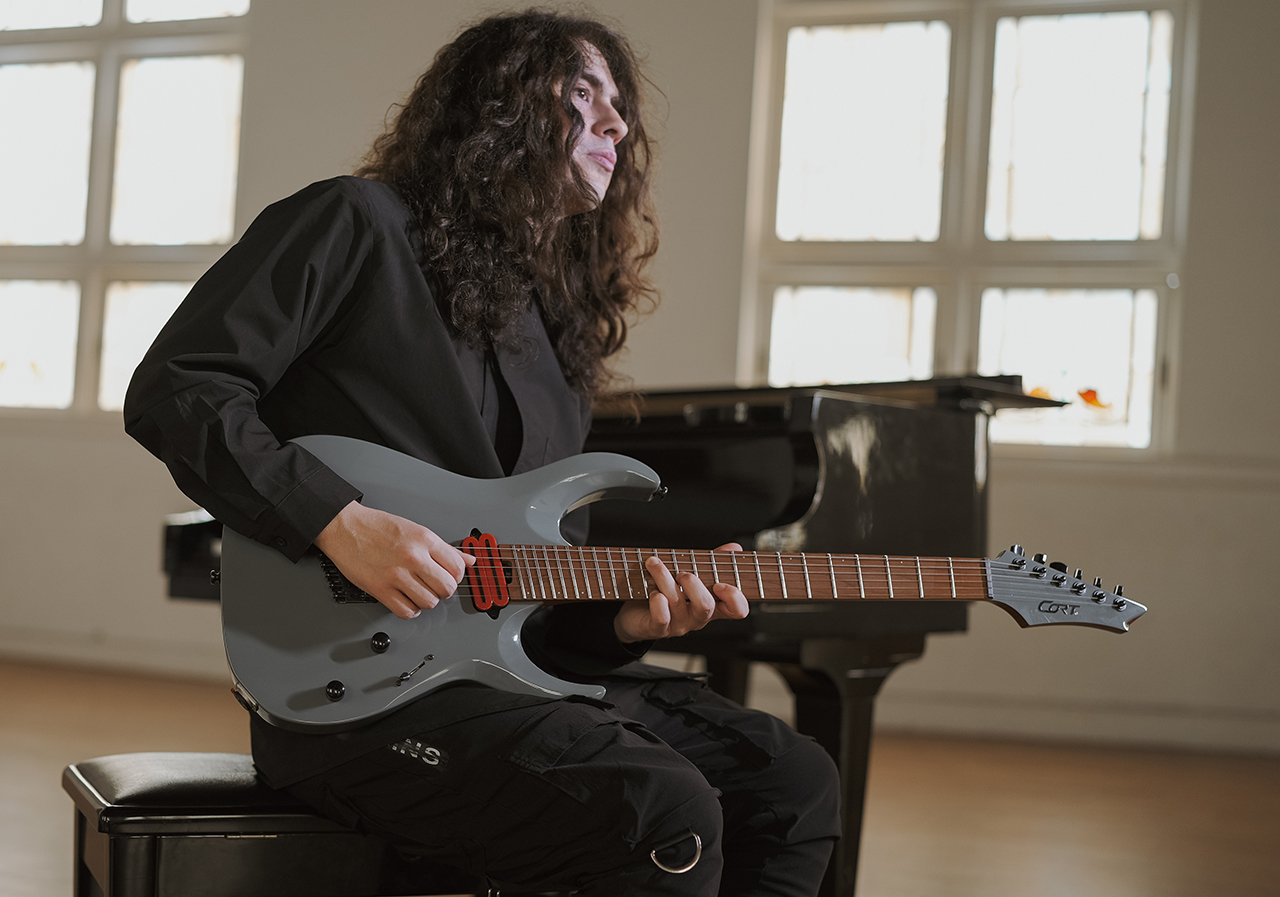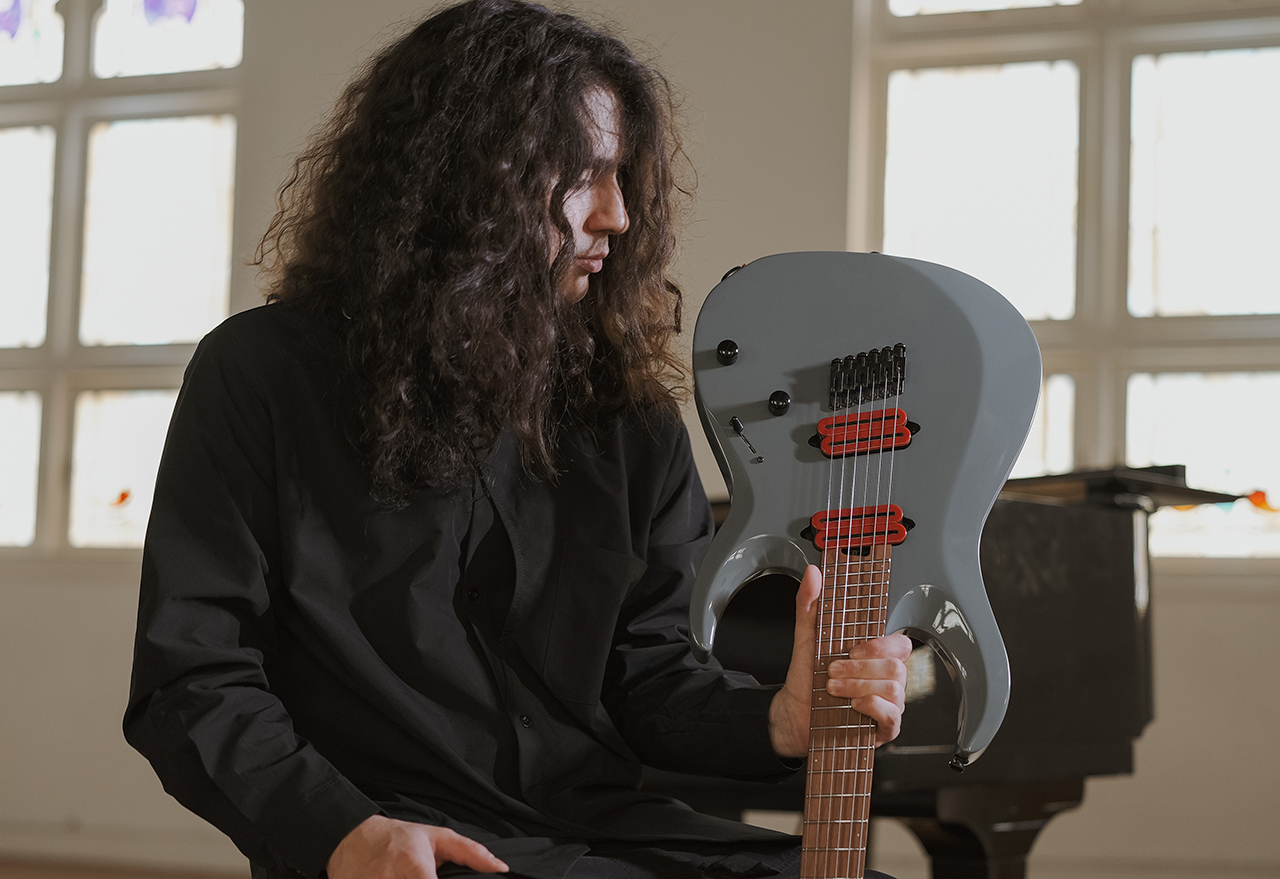“I’m seeing players compose something crazy-hard and pretend they can play it when they can’t. It’s dishonest”: How Hedras became one of today’s leading virtuosos by fusing shred smarts and boomer sensibilities
The Cort signature artist on why it’s worth the long climb up Shred Mountain, teaching Tosin Abasi tapping tricks and standing by an effect that many of his contemporaries have abandoned

All the latest guitar news, interviews, lessons, reviews, deals and more, direct to your inbox!
You are now subscribed
Your newsletter sign-up was successful
Guatemalan virtuoso Hedras’ latest solo album Front Line is a heart-on-sleeve work where his two distinct disciplines – angular progressive metal and free-flowing jazz – meet. Facing the realities of being a modern musician, he admits it was a struggle to stay motivated when he has bills to pay.
“You’re trying to push hard on your instrument but you’re busy every night playing gigs,” he says. “I found the secret is just to grab the guitar and start playing. Something will happen. If you’re lazy and don’t grab the guitar, you’ll be a victim.”
Front Line was written while he’d been laid off for six months by Sam Ash during 2020’s lockdown. It sounds like John Petrucci and Tosin Abasi invading the New York jazz scene – a wild ride.
Abasi’s influence is all over the album. What do you admire about him?
“He’s always on the hunt to discover new things. So many rock guitar players hit a certain threshold and stay there forever. He keeps pushing. He just texted me, like, ‘I bought your tapping package.’ I’m like, ‘Bro, you already have those skills! Why did you do that?!’”
There’s a ton of wah on Victorious. It seems to have fallen out of favor in modern metal.
“I like wah! I grew up listening to Joe Satriani and John Petrucci. It's a cool boomer tool – it's so ingrained in my brain because of them – and it forces you to play every note and bend in a certain way. I think it adds a lot of dimension.”
All the latest guitar news, interviews, lessons, reviews, deals and more, direct to your inbox!
How do you navigate the complexity-versus-simplicity divide?
“You’ve got to negotiate with yourself. Some players think, ‘If it doesn’t impress me, it’s not worth it.’ But I think that’s wrong. Music has never been about that. The older I get, the more I understand the boomers! People react better to a strong melody than a 32nd-note line, one even with great design and cool motifs. Most people prefer the bends of Clapton to Allan Holdsworth.
“I find a lot of beauty in complexity and intervallic changes, but I’ve started to see beauty in other things. I want to play melodies that people can sing. If you listen to Guthrie Govan's solos on Erotic Cakes, even when he’s playing fast, there are very clear moments you can sing.”
You’re one of the most notable Cort artists – how did you link up?
“When I still lived in Guatemala, they were looking for a player to do a run of clinics in South America. But I wasn’t interested in their guitars; I was playing a PRS and I was really happy with it. The clinics idea seemed pretty cool so they sent me some guitars.

“After more than 10 years together, and six years of having signatures, I really believe in these guitars. They build a lot of Sterling by Music Man, Strandberg and Fender in their factory now. Those brands trust them; they have the knowledge. I’m very fortunate to be working with them.”
When designing a guitar, what are your must-haves?
“I really like fat necks. The necks on my Corts are super-fat, but they’re actually customs; the mass-production guitars have very fast necks that most people seem to enjoy. Thick necks help me play more effortlessly. There’s less travelling and motion on the fingers because your hand isn’t opening and closing as much.
“Another thing I cannot live without is good single coils. I really like Fishman pickups, and even with split-coil humbuckers, they have amazing sounds.”
Anything you’re less picky about?
“Some people tell you the woods make all the difference and others say it’s the pickups. To my ears, it’s the type of finish. When the whole guitar has a satin or open pore finish, it sounds… I don’t know if it’s spankier or warmer but it’s different than a gloss finish.
“Maybe there’s more connection with the instrument and your skin than with gloss finishes – it’s more organic. There’s even a difference when you play acoustically.”
What are your current favorite pieces of gear?
“I've been using a lot of the Revv G3 distortion pedal. You don’t have to go past half, and the sustain you get is insane. I’ve been using that through a Laney Lionheart clean channel. I’ve been using the Hotone Ampero Stage II for pop gigs; it’s very versatile. DigiTech has sent me some pedals, too – the Ricochet is a very fun thing to have.
Are we separating ourselves from the limitation of our hands and letting imagination go into a different state?
“But if I’m going to play my own music, I need distortion from my amp, and the Laney Ironheart has a very warm, rounded tone. I can get close to the Petrucci sound with that.”
What’s your approach to writing solos?
“I consider the feel of the song and where the solo is happening. I want a solo that connects the dots. Most of my solos are composed – even when the songs are heavy, there are usually modal changes, but they start with improvisation.

“The goal is to write music. I want everything I do to be intentional and honest, especially with so many fake players online. I’m seeing players compose something that’s crazy-hard to play on Guitar Pro, put the MIDI through an amp sim, and pretend they can play it, when they can’t. It’s dishonest.
“It’s the culture of shortcuts. Everybody wants to hit 1,000 likes, get endorsements fast and make money easily. Players are reaching levels that aren’t possible to perform. But they can come up with some very cool stuff. Are we separating ourselves from the limitation of our hands and letting the imagination go into a different state?
“If I don’t limit myself I come up with crazy ideas. So from the perspective of a composer there are some gains. But you’re losing the honesty of human skills. It’s more honorable to be able to play the music you’re producing. If I have to work really hard to nail a part, it needs to happen.”
Are people too social media-focused?
“If you’re pursuing the reward rather than the love of playing, you’re going to fail at some point. The journey is too ugly. The only way you can still be playing guitar at 50 is if you do it for love. For developing a language and real skills on the guitar, there are no shortcuts. It takes time – but some people don’t want to go through that.”
- Front Line is out now.
A freelance writer with a penchant for music that gets weird, Phil is a regular contributor to Prog, Guitar World, and Total Guitar magazines and is especially keen on shining a light on unknown artists. Outside of the journalism realm, you can find him writing angular riffs in progressive metal band, Prognosis, in which he slings an 8-string Strandberg Boden Original, churning that low string through a variety of tunings. He's also a published author and is currently penning his debut novel which chucks fantasy, mythology and humanity into a great big melting pot.
You must confirm your public display name before commenting
Please logout and then login again, you will then be prompted to enter your display name.


